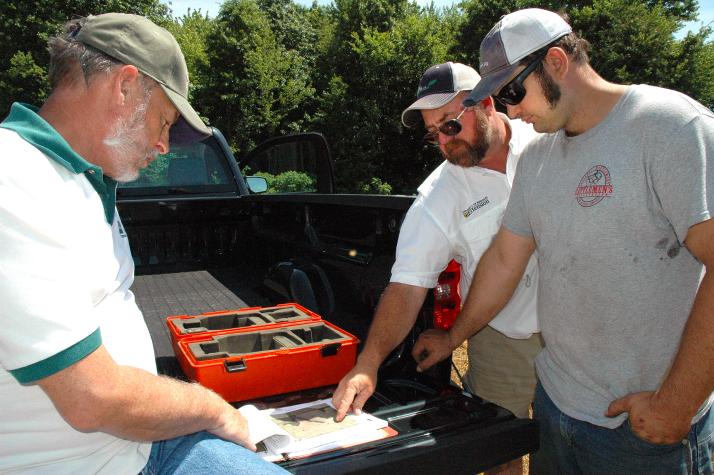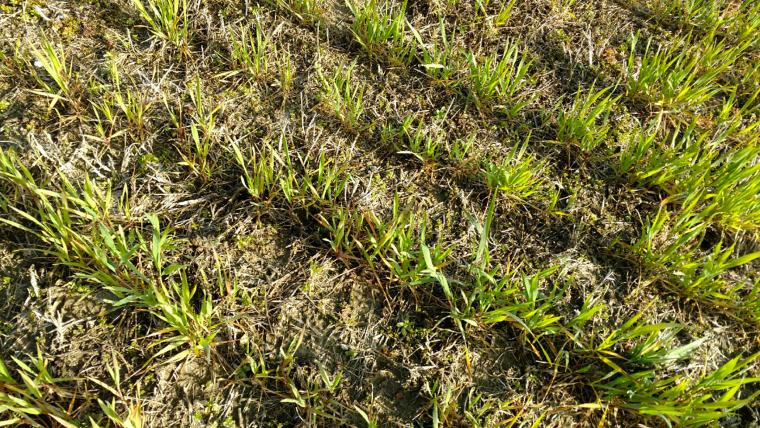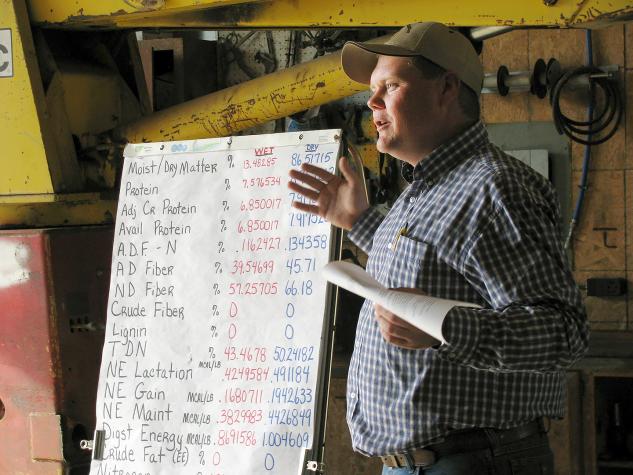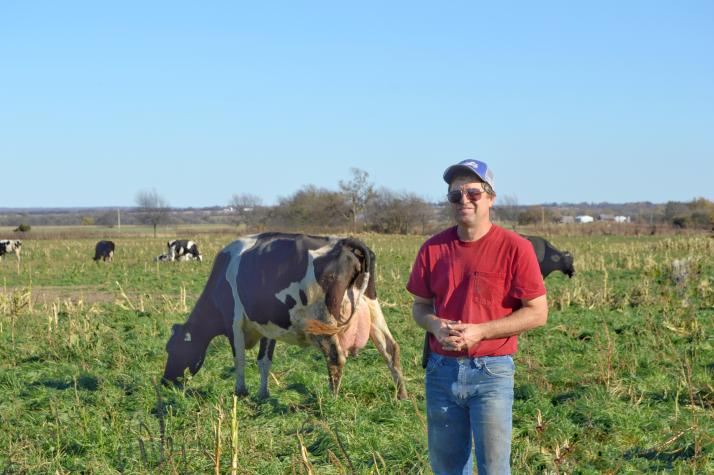Seeding oats and clovers now improves spring grazing
STOCKTON, Mo. – Now is the time to seed oats and clovers to improve spring cattle grazing resources and reduce costs, says University of Missouri Extension livestock specialist Patrick Davis. “Feed is a major cow-calf operation cost,” says Davis. Oats and clovers are forages to seed now to improve spring grazing resources and help reduce supplemental feed costs.
Considerations for using cover crops on prevent plant acres and/or following flood situations
Learn how cover crops can protect soil, control weeds, and provide forage on prevent-plant or post-flood acres.

MU Extension, NRCS partner to help farmers convert cropland to pasture
Farmers get guidance and cost-share help to convert cropland to pasture using rotational grazing and conservation practices.
Cool-season pastures start regrowth with arrival of warm-weather rains
COLUMBIA, Mo. – Cool-season grasses such as fescue that dominate pasture grass in Missouri need warm weather to grow.The coldest April since 1907 set back forage for Missouri’s beef cow herds. Now, warm weather with rain creates forage for grazing and haying, said forage specialist Craig Roberts in a weekly University of Missouri Extension teleconference.New grass growth works best if an early crop of seed heads were clipped. That idea…
Prepare for grass tetany season
COLUMBIA, Mo. – A University of Missouri Extension beef nutrition specialist counsels farmers to prepare for grass tetany season in March.Grass tetany can result from a magnesium deficiency in spring calving herds consuming lush forages high in potassium and low in calcium and sodium, said Justin Sexten of the MU Extension Commercial Agriculture Program.
Put your pasture lease agreement in writing
BLUE SPRINGS, Mo. - High commodity prices provide an opportunity for landowners to increase their income by converting pasture to crop production. This has created urgency among cattlemen to secure grazing land for their cattle and other livestock, said a University of Missouri Extension agriculture business specialist.
Increasing the winter survival rate of alfalfa
BLUE SPRINGS, Mo. - While the harvest of corn and soybean is underway, perennial crops such as alfalfa begin the cold-hardening process. Producers can increase the ability of plants to withstand cold temperatures by implementing several key strategies, said a University of Missouri Extension agronomy specialist. "First, a four- to six-week fall rest period is recommended for alfalfa stands," said Julie Abendroth.
Plan now for fall forage
BLUE SPRINGS, Mo. — It wasn’t the best of springs for baling hay. “Stockpiling fall forage can stretch your hay supply by delaying how early you start feeding hay, plus reduce your harvesting costs,” says Pat Miller, University of Missouri Extension agronomy specialist. “Think of it as letting the cows do their own harvesting,” she says.“Fall fescue pastures have excellent forage quality, running 15 to 18 percent protein.”
To raise quality, make hay before seeds set
COLUMBIA, Mo. – “Don’t delay making hay,” says Rob Kallenbach, University of Missouri Extension.It might not seem like haymaking time, or haymaking weather, but early harvest results in more quality forage through the season, says the state forage specialist.Producers needing to build reserves of baled hay depleted by hard winter should harvest early and often.May is a better hay month than June and far better than July.
When grass seed heads appear, hay quality drops
COLUMBIA, Mo. – So far, it’s a bad hay year. Cool weather, lack of sun and dry soil slowed grass growth.Dry matter per acre is about one-third of what we expect this time of year, says Rob Kallenbach, University of Missouri Extension forage agronomist.He spoke to regional extension specialists in a weekly teleconference.“There’s hope,” he adds. “With warmth and rain, we can still grow lots of good hay. It will take management to make…
Extra moisture can extend grass growth into summer slump, says MU specialist
COLUMBIA, Mo. – Rain makes grass grow. That’s good for grazing livestock, but makes haying difficult.Craig Roberts, University of Missouri Extension forage specialist, sees unusual potential for cattle producers.Those who made a first cutting of hay can get a strong second cutting and have possible regrowth to extend the grazing season into the summer.
MU tool helps farmers decide on pasture insurance
Use an online tool to see if pasture insurance fits your farm based on daily rainfall and coverage options.
Deep roots help grass stay green in dry spell; grazing grass too short kills off root systems
Deep roots help grass survive drought, but overgrazing weakens root systems. Rotational grazing boosts pasture growth and efficiency.
Harvesting hay late reduces quality
COLUMBIA, Mo. – Rain-delayed haymaking leads to poor-quality feed for livestock next winter. Supplemental feed will be needed to make balanced rations, says University of Missouri Extension forage specialist Rob Kallenbach.A hay test makes the first step in learning how much supplement will be needed, Kallenbach told MU regional agronomists in a weekly teleconference.
Cover crops can provide many benefits
COLUMBIA, Mo.– Having plant growth in fields year-round can improve the soil, according to Tim Reinbott, superintendent of the University of Missouri Bradford Research Center. He says using cover crops in the fall and spring can provide large benefits.“We have our grain crops in the summertime, but crops in the fall and spring are extremely important in helping soil health,” Reinbott said.
Is it cost-effective to bale your own hay?
BLUE SPRINGS, Mo. — The greening of pastures and the rising of temperatures have led ruminant-livestock owners to start thinking about the upcoming haying season.“Because hay is a relatively inexpensive feed when grass is unavailable, many livestock owners want to produce hay for the winter from the abundance of grass that their pastures yield in the spring,” said Whitney Wiegel, University of Missouri Extension agriculture business…
Grazing wheat in Missouri
BLUE SPRINGS, Mo. — Recent rains have given producers hope that they will be able to plant wheat this fall. Producers may be looking to plant wheat not only for a grain crop but also to provide some fall and early spring grazing, says a University of Missouri Extension agronomy specialist.
Dry weather can lead to a lethal lunch
Most people don’t think of grass as poison, but dry weather and drought can turn a pasture dangerous. Nitrates and prussic acid built to lethal levels in the stems and leaves of some plants as the hot days of July and August slowed forage growth to a halt. To protect your herd, University of Missouri Extension experts recommend a simple test to ensure cows aren’t chewing their way to disaster.

Cold start to April delays crops
Unseasonably cold April weather in Missouri has delayed corn planting, stressed wheat fields, and strained pasture and hay supplies for farmers.
Planning, patience lead to better forage and cattle
STOCKTON, Mo. – Patience pays off for cattle producers who wait for fescue to grow some before turning cattle out for spring grazing, says University of Missouri Extension livestock specialist Patrick Davis.“After a long winter of feeding hay, producers are anxious to turn cattle into the fescue pasture,” Davis says. “However, it is better to wait until fescue grows to heights of 3 to 8 inches before letting cattle onto fescue pastures…
Is there clover in there?
Learn why legumes like clover improve forage, boost nitrogen, balance pH, and support soil test recommendations.
Alliance plans fescue schools to teach replacing toxic grass
COLUMBIA, Mo. – Ways to replace toxic tall fescue pastures keep improving as renovations move across the Fescue Belt from Missouri to Georgia. Five grazing schools in five states in March will clarify a complex system, says Craig Roberts, University of Missouri Extension forage specialist.
Lime doesn’t harm K-31 fescue but nitrogen adds to toxicosis
COLUMBIA, Mo. – Adding poultry litter or nitrogen to toxic fescue pastures grows more grass, but also boosts toxins in the grass.A three-year study at the University of Missouri shows liming helps grass but doesn’t increase ergovaline. That toxin harms grazing cattle many ways, mostly in lost production. In recent frigid cold, farmers reported cases of fescue foot caused by the toxin. Cattle losing their hooves must be put down.

Testing tells alfalfa's worth
Test alfalfa hay to know its true nutritional value, boost livestock performance, and make informed feeding and supplement decisions.

Missouri Holstein cow produces nearly 24 gallons of milk per day
MOUNT VERNON, Mo. – Missouri Holstein Dezi is a moo-ver and a milker.The Lawrence County cow outperforms most of her regional counterparts, producing just short of three times as much milk per day, says University of Missouri Extension dairy specialist Reagan Bluel.Dezi, owned by farmer Karl Wilke, churns out 201 pounds of milk per day. That’s the equivalent of about 24 gallons—15 gallons more than the average Holstein.
